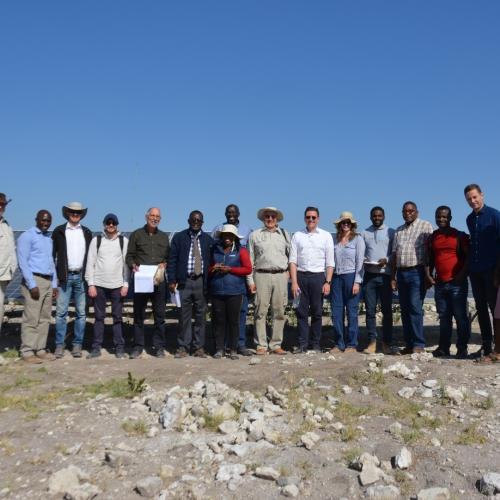CLIENT II regional video Africa in FONA newsletter

Coordinator: Ingolstadt University of Applied Sciences (THI), Institute for New Energy Systems (InES)
Contact Person: Professor Wilfried Zörner
Address: Esplanade 10, 85049 Ingolstadt
Phone: +49 8136 22 89 599
Email: wilfried.zoerner(at)thi.de
Project partners
Project partner in Namibia
In Namibia, more than half of the rural population has no access to electricity. In many parts of the country, connection of households to the national grid is neither technically nor economically feasible. The lack of access to electricity remains one of the biggest obstacles to poverty reduction and industrialisation efforts. The German-Namibian joint project PROCEED is examining options for an efficient, sustainable and renewable energy-based power supply in Namibia via so-called island networks.
Due to its low population density and a sparsely distributed settlement structure, Namibia faces particular challenges in the electrification of remote areas. Despite the abundant supply of solar, wind and biomass resources, the national power grid has so far supplied just under 20% from renewable sources. Renewable energy-based hybrid systems, consisting of regenerative power sources, a battery system and fossil-powered backup generators, are already available for a clean energy supply. But despite the falling costs of such off-grid technologies, the majority of society in rural areas of Namibia cannot afford power from these systems.
The goal of PROCEED is to improve the situation of the population in remote areas that do not have access to a reliable energy infrastructure. For this purpose, suitable options will be developed for the design of renewable energy-based models for energy supply via hybrid energy systems.
The German-Namibian project consortium will carry out an analysis of the energy demand and the possibilities for energy supply in rural areas of Namibia. The focus here is on conducting case studies on three existing off-grid systems, so-called mini-grids. An analysis of these off-grid hybrid energy systems will identify models for the use of renewable energies that fit the local needs and societal context and which are also technically up-to-date, economically viable, easy to maintain, and therefore sustainable. Concepts for the optimisation of rural electrification will be developed in close cooperation with the local partners.
Central to PROCEED is the linking of the technological, social, economic and environmental aspects of energy supply. To ensure effective implementation, the project explores various aspects of mini-grid deployment: Mini-grid communities, mini-grid economics, mini-grid technology, and mini-grid sustainability. The project activities are coordinated and controlled by the Ingolstadt University of Applied Sciences. Researchers at the University of Bayreuth will conduct interviews and data surveys to analyse geographic and sociocultural conditions (mini-grid communities) for increased power generation through off-grid hybrid energy systems. On the topic of mini-grid economics , the University of Applied Sciences Neu-Ulm is investigating the issue of a cost-covering tariff and payment system for decentrally organised hybrid energy systems and developing suitable business models for the commercial use of the generated electricity. The determination of consumption profiles and building loads as well as the optimal design of hybrid systems based on renewable energies are the focus of research on mini-grid technology under the direction of the Institute for New Energy Systems at the Ingolstadt University of Applied Sciences. By formulating practical recommendations for action and developing training program concepts based on the outcomes of these three main research areas, the fourth focus, mini-grid sustainability, will enable the sustainable utilisation of project results at national and supraregional levels.
PROCEED is not only promoting technology transfer in the field of renewable energies, but is also strengthening the network of relevant actors at the German, Namibian and regional level in the Southern African Development Community (SADC) region.
All project activities are carried out in close cooperation between German and local partners. The Namibia Energy Institute, its corporate partner Alensy Energy Solutions Ltd and the Renewable Energy Industry Association of Namibia, for example, are bringing in findings from previous electrification projects. At the same time, ongoing exchanges with national institutions such as the Ministry of Mines and Energy and regional institutions such as the SADC Center for Renewable Energy and Energy Efficiency will ensure that the project is in line with the policy agenda. This makes the results a valuable resource for the long-term promotion of renewable energy-based hybrid energy systems, for instance by the Hanns Seidel Foundation Namibia.
At a higher level, PROCEED's interdisciplinary approach contributes to the development and implementation of technologies, system solutions and services in the field of energy supply in rural Africa.


